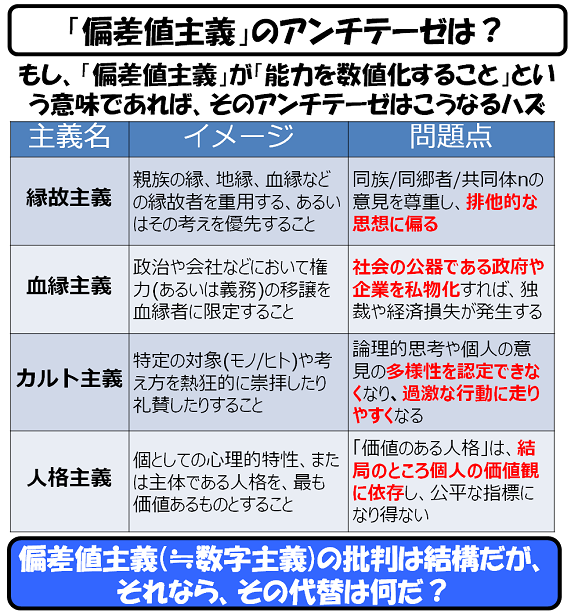三国志の劉備が、諸葛孔明に対して、3度自宅を訪問してリクルートをした、いわゆる「三顧の礼」ですが、どうも、あれも、一種の「学歴主義」の成せる業だったという説があります。
三国志の劉備が、諸葛孔明に対して、3度自宅を訪問してリクルートをした、いわゆる「三顧の礼」ですが、どうも、あれも、一種の「学歴主義」の成せる業だったという説があります。
Liu Bei's so-called 'three visits' in the Romance of the Three Kingdoms, when he visited Zhuge Liang's home three times to recruit him, are said to have resulted from a kind of 'academic meritocracy.'
三国志の英雄たち("桃園の誓い"の参加者である3名)は、基本的に「学」がありません(正確には、『修学』していない)。
The heroes of the Three Kingdoms (the three participants in the "Peach Garden Oath") have no 'education' (or, more precisely, no 'training').
ですから、彼らは、きちんと学を収めた人間(諸葛孔明)に対して、過大な敬意と期待があったたということです。
So, they had excessive respect and expectations for a person (Zhuge Liang) who had completed his studies correctly.
この話には、『なるほど』と思わせる説得力があります。
This story has a persuasive power to make you think, 'I see.'
-----
私は自分の知らないことを知っている人の言っていることは、基本的に『正しいことを言っているだろうと』と考えます。『推定』をするのです。
I presume that someone who knows something I don't know is saying that they are probably right. ' I make a 'presumption'.
大切なことは『推定』です。『確定』ではありません。
The important thing is 'presumption'. It is not 'final'.
------
「推定」とは、特定の事実が他の事実から合理的に導き出されることを指します。法律上、推定は確かな証拠がなくても、一定の条件下で事実を認めるための制度です。推定は反証可能であり、他の証拠や状況によって覆されることがあります。
'Presumption' means that specific facts can reasonably be derived from other facts. In law, a presumption is a system for admitting facts under certain conditions, even without solid evidence. Presumptions are rebuttable and can be overturned by other evidence or circumstances.
比して「確定」とは、事実が法律的に確定され、変更や反論の余地がない状態を指します。確定された事実や判決は、法律上の効力を持ち、当事者を拘束します。
By comparison, 'final' means that the facts have been legally established and are unalterable or irrefutable. A confirmed fact or judgment has a legal effect and is binding on the parties.
------
この具体例が、子どもの親に対する、父親と母親の違いです(ここではジェンダーに関する問題は論じず、父親と母親は生物学的な雄と雌ということにします)。
A concrete example of this is the difference between fathers and mothers concerning their children's parents (we will not discuss gender issues here and will assume that fathers and mothers are biological males and females).
子どもが生まれた瞬間、母親はその子どもの親として『確定』しますが、父親は『推定』されるだけです(民法772条)。
When a child is born, the mother is 'final' as the child's parent, but the father is only 'presumed' (Civil Code Article 772).
父親は「嫡出否認の訴えは出生後1年以内に起こす必要がある」となっています。父親は、子どもの誕生後、1年後に親として法律的に確定するのです。
Fathers are "required to bring an action for the denial of illegitimacy within one year after the birth." That means The father is legally established as a parent one year after the child's birth.
この話を家族にしたらビックリしていました。
When I told my family about this, they were surprised.
次女:「じゃあ、パパは、私が生まれてから1年間は、"パパ"ではなかったの?」
Second daughter: 'So, you weren't a 'dad' for the first year after I was born?'
私:「そうではなくて、"パパ"であることを否認できる期間が1年間あった、ということなんだが ―― まあ、そういう理解でもいいかな」
Me: "No, I mean that there was one year during which I could deny being a 'dad' - well, I guess that's how I understand it."
閑話休題
Now, let's return to the main subject
------
諸葛孔明は、
Zhuge Liang was,
(1)当時の学歴主義によって、『優れた軍師であるかもしれない』と「推定」され、
(1) 'presumed' to 'may be a good military strategist' due to the academicism of the time; and
(2)その後の実績で、『優れた軍師である』と「確定」した
(2) 'final' as an excellent military strategist' by his subsequent achievements.
ということです。
つまるところ、私たちは、社会から「推定」をして貰えないと、「確定」に至れない、ということです。
The bottom line is that we cannot be 'final' unless we are 'presumed' by society.
Signalling theory.
『三国志は、純粋な実力主義の物語ではない』というのは、当然です。
'The Three Kingdoms is not a pure meritocracy story,' of course.
むしろ、三国志は、縁故主義、血縁主義、カルト主義、人格主義満載の物語です。
Instead, the Three Kingdoms is a story full of nepotism, kinship, cultism, and personality.
(クリックすると、コラムに飛びます)
(Click to jump to the column).
しかし、三国志に「学歴主義」も入っているとするなら ―― これは、ほとんど、現代の物語と同じです。
But if the Three Kingdoms also contains 'academic meritocracy' - this is almost the same as the contemporary story.
